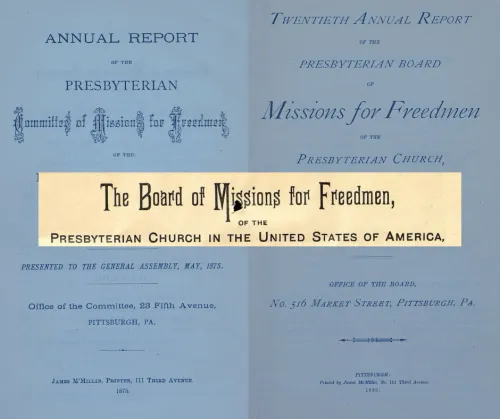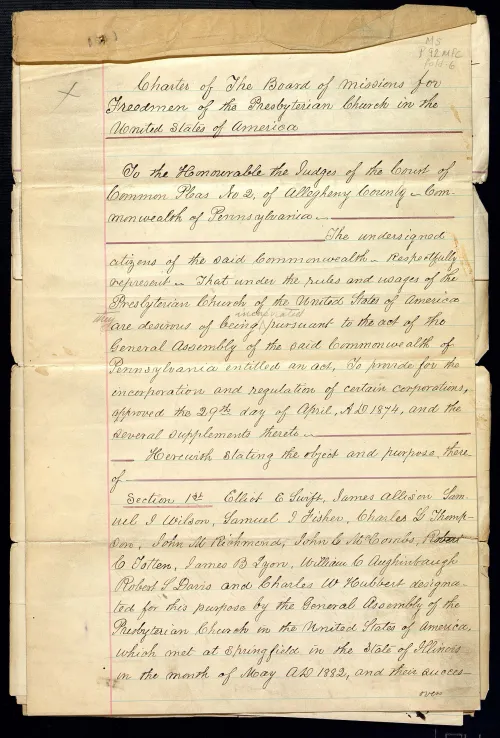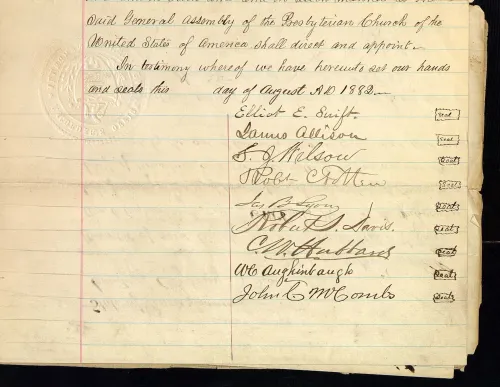Unearthing the past: Juneteenth and the Board of Freedmen records
Presbyterian Historical Society archives bear witness to national holiday’s focus on education and the celebration of freedom

Juneteenth, celebrated June 19th of every year, marks America’s second Independence Day — an enduring celebration of freedom and the oldest nationally recognized commemoration of the end of slavery in the United States.

Although for many years Juneteenth was a holiday celebrated solely within the bounds of Texas, today many communities across the country observe Juneteenth, with prayer services being a major part of the celebrations. For example, at the biennial conference of the National Black Presbyterian Caucus, which is being held June 19-21 in Charlotte, North Carolina, participants will gather for evening worship and a Juneteenth celebration, “a powerful remembrance of freedom, faith, and resilience,” according to the Rev. Dr. Charles Heyward, NBPC president.
This holiday, which was nationally recognized in 2021, commemorates the announcement of the abolition of legalized slavery in Galveston, Texas, on June 19, 1865. The reading of General Order No. 3 was offered by Major General Gordon Granger and came two-and-a-half-years after President Abraham Lincoln’s Emancipation Proclamation.
The news of both the proclamation and the Confederate loss two months prior to Granger’s arrival had not yet reached the folks living in Texas. When they heard Granger’s announcement, it sent ripples of joy and celebration throughout the state. From that moment forward, June 19 became a day for parties, gatherings and communal commemoration.

Two years after Granger’s arrival in Galveston, “Emancipation Day” was celebrated at the Texas capital under the direction of the Freedmen’s Bureau. By 1872, it was noted on public events calendars, and communities across the state threw parties and festivals in honor of the day they learned of their freedom. Juneteenth became an official Texas state holiday in 1979, when Governor William P. Clements, Jr., signed the bill introduced by State Rep. Al Edwards of Houston and adopted by fellow legislators. The first state-sponsored Juneteenth celebration occurred the following summer.
Presbyterian Historical Society houses the records of the United Presbyterian Church in the U.S.A.’s (UPCUSA) Board of Missions for Freedmen. Before being formally incorporated in 1883 and becoming the Board of Missions for Freedmen, the group was called the Committee of Missions for Freedmen, or the Freedmen’s Committee, and was created in 1865 at the end of the Civil War.

The goal of both the Committee and Board was to support formerly enslaved people in pursuing an education and career, namely through the training of teachers and preachers. Through fundraising, it built and supported Black schools, churches, colleges and seminaries throughout the southern United States. In 1923, the Freedmen's Board was one of several boards and agencies that merged to become the Board of National Missions.
In the PHS archives, find annual reports, correspondence, minutes, and application books that date back to July 1864. If your curiosity stretches beyond this read, you can visit the PHS blog, access the guide to this collection or browse the Pearl digital collection to see more documents from the mid-19th century that speak on the experiences and realities of formerly enslaved people in the U.S.
You may freely reuse and distribute this article in its entirety for non-commercial purposes in any medium. Please include author attribution, photography credits, and a link to the original article. This work is licensed under a Creative Commons Attribution-NonCommercial-NoDeratives 4.0 International License.




